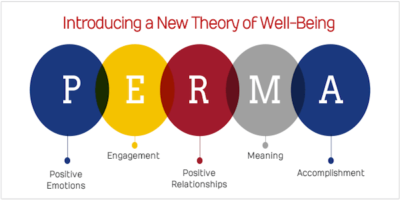Positive Education
Positive education is the combination of traditional education principles with the study of happiness and wellbeing, using Martin Seligman‘s PERMA model
Positive education is based on the science of well-being and happiness.
Seligman, one of the founders of positive psychology, has incorporated positive psychology into education models as a way to decrease depression in younger people and enhance their wellbeing and happiness. By using his PERMA model (or its extension, the PERMAH framework) in schools, educators and practitioners aim to promote positive mental health among students and teachers.
The PERMA and PERMAH Frameworks
PERMA encompasses five main elements that Seligman premised as critical for long-term wellbeing:
Positive Emotions: Feeling positive emotions such as joy, gratitude, interest, and hope;
Engagement: Being fully absorbed in activities that use your skills but still challenge you;
(Positive) Relationships: Having positive relationships;
Meaning: Belonging to and serving something you believe is bigger than yourself;
Accomplishment: Pursuing success, winning achievement, and mastery.
The PERMAH framework adds Health onto this, covering aspects such as sleep, exercise, and diet as part of a robust positive education program (Norrish & Seligman, 2015).
Traditional Vs Positive Education
If discipline, numeracy, hard work, science, literacy, conformity, etc what a traditional school teaches through its curriculum are taught along with well-being, joy, meaning, fulfilment, engagement…without compromising the traditional goals of the school, the new education approach could be defined as Positive Education.
It is easy to predict what parents want most for their children. They want them to be happy, confident, and content. The irony of schools is that we do not teach these skills; rather, we teach children how to achieve success through discipline and learning and thinking skills. According to Helen O’Connor, Positive education is about teaching skills that enable wellbeing and achievement, and it comes without compromise to either.

